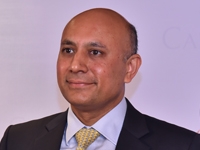FT has witnessed a growth of 15% over the last one year in terms of AUM. What led to this growth?
We have grown by 15% in terms of quarterly average AUM and 21% on the basis of month-end AUM for the year ended March 2019. In comparison, the industry has grown by 6% and 11%, respectively. Over 80% of our incremental AUM was attributed to fixed income funds while the balance was in equity funds.
At a time when the industry saw de-growth of 7% in fixed income assets (ex-liquid and ultra-short term funds), Franklin Templeton saw a 27% growth over the past year. We have gained assets not only in credit funds which has been an area of strength for FT, but have also diversified and gained assets in the high credit and the institutional client space. Re-launch of FMPs and launch of our overnight fund were a part of this diversification.
What is your roadmap for the company three years from now?
Less than 5% of Indians currently invest in mutual funds. So our primary focus will always be to add new investors in association with our distribution partners. We have always stayed away from the short-term chase for AUM as we firmly believe that as customers grow, AUM will follow. It is also our belief that if we look after the customer, the business will look after itself.
Millennials and retirees are two segments to look at. One third of India’s population are millennials who have the inclination to look at non-traditional modes of investments like mutual funds. With declining interest rates from traditional products besides increasing life expectancy, retirees too will need annuity solutions which will not only beat inflation, and are tax efficient, but most importantly will help them enjoy the lengthened period of retired life. The message we would be carrying here is that mutual funds are not just accumulation or wealth creation products, they can also offer decumulation or annuity solutions via Systematic Withdrawal Plans or SWPs.
We would also look at taking fixed income funds to retail investors as this is a fairly under-penetrated segment. Mutual funds and SIPs are still widely believed to be equity oriented and flows start drying up when markets hit a volatile patch. Adding fixed income SIPs to the portfolio can help curb portfolio volatility for investors, continue the discipline of regular saving and investing while helping stabilise flows in a bear market.
We have also invested in building a solutions platform. Solutions is a growth area globally, and through this platform, we aim to bring customised solutions to our investment management, wealth management, family office and high net worth clients.
Last but not the least, we understand that “What got you here, will not take you there” and hence see the need to scale up at a much faster pace than we did so far. For this, we will continue to invest in technology, which will play a key enabling role in our efforts to scale efficiently. We have introduced several new technology features for our distribution partners in order to help them focus on the core business of adding and growing their investors while leaving the operational aspects to technology.
What would be the impact of stamp duty on the mutual fund industry?
In the interim budget announced in February 2019, the Union Finance Ministry had announced that the government would levy stamp duty on financial securities transactions, which includes financial instruments like direct stocks and mutual funds. Since mutual funds deal with shares, every time a fund manager executes a transaction, the fund needs to pay stamp duty along with securities transaction tax.
Further, it is believed that purchases and redemptions of mutual funds would also be liable to stamp duty. This will have a large impact on mutual fund investors and the industry in terms of cost and compliance. We await clarity on various aspects of stamp duty related to applicability, payment, etc. However, given that the underlying securities would already be liable to stamp duty, and that mutual funds are a pass through vehicle, it would be ideal if an exemption was provided to investors in mutual funds.
Considering the rationalisation in TER, margins of AMCs have reduced. How would you ensure that the profitability of the fund house remains intact?
I have always maintained that regulations are a given and we need to look beyond regulations to grow our business. Ever since the time entry load was abolished ‘naysayers’ felt that our industry was finished and this was repeated every time a new regulation was announced. But the fact remains that regulations have had only a transient impact while the industry has continued to grow manifold.
In case of the TER regulation too, there will be a transient impact on the topline and bottomline of AMCs. However, I strongly believe that this will be compensated by continued growth in the industry, and that too in the relatively near term.
In your opinion, how can distributors grow their business in the all-trail model?
Franklin Templeton was the first in the industry to introduce an all-trail model, much before regulations required this. The trail model is a well-aligned model and allows distributors to benefit not only from new sales, but also from underlying asset growth. Hence, the all-trail model creates a great long-term annuity type of income stream for distributors. There may be some disruption in short-term cash flows, but I believe this model will benefit distributors in the long run in a rapidly growing and under-penetrated market like India. The best way to compensate for any business impact due to regulations is to gather new clients and scale up the business.
Strategies like Step-Up and Perpetual SIPs can help distributors grow their existing investors besides increasing longevity of investments and bringing in the power of compounding to investor portfolios. Focusing on under-served segments like millennials and retirees for accumulation and decumulation solutions respectively will also be important. We continue to see an opportunity to bring fixed income funds to retain investors. Finally, the use of technology, including effective use of social media as a powerful and timely communication tool, will be critical to continued growth and success.
While many AMCs have either opted to pass on the entire TER cut to distributors, others have absorbed some portion of cut. What is your fund house doing on this front and why?
We have always taken a partnership approach as we believe both AMCs and distributors must work together to grow the business. We have adopted the same approach with regard to TER cut as well.
SEBI has been pushing fund houses to promote direct plans among investors. How do you plan to promote direct plans among investors at large?
We will continue to make direct plans accessible to investors who choose these products. One must remember that direct plan investors are not necessarily self-directed – fee based advisors, and many fintech platforms also use direct plans as the underlying investment vehicle. We believe the choice must always rest with the investor and our role as manufacturers is to make all choices available to investors.
With the emergence of direct plan sellers like Paytm money and ET money, how will it impact distributors selling regular plans?
In my view, the more people talk about mutual funds, and the more easily investors can access funds, the more new investors we will be able to bring to this industry, which is good for all industry stakeholders.
At this time, it appears from anecdotal evidence that such platforms are actually addressing an underserved segment, rather than competing with existing advisors. This has also been the experience in other geographies.
How do you plan to deepen your engagement with distributors?
Franklin Templeton has been one of the pioneers in distributor training and engagement when we had launched our Franklin Templeton Learning Academy more than a decade ago. While classroom training was the only way to deliver training in the initial years, digital training has allowed us to scale up across the length and breadth of the country. We continue to innovate in this space to help all partners gain and disseminate knowledge more easily.
We have also introduced a number of other offerings including social media support, quizzes, data analytics and operational support besides regular interactions with the management and investment team.
We also continue to invest in technology to not only help partners transact more easily, but also to help them build their business and take advantage of the growth on offer.







